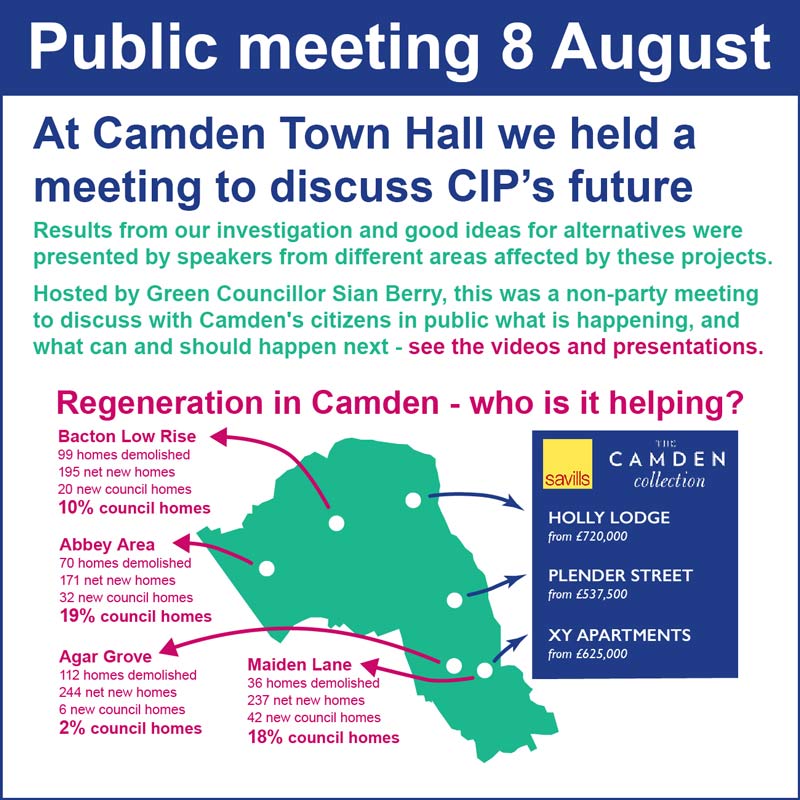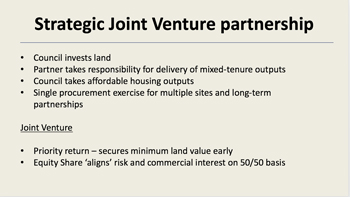Camden Council is currently reviewing the Community Investment Programme so far, and the options for future projects.
This is being done behind closed doors with a ‘working group’ of only Labour councillors. We think the record of the CIP so far and all the options being considered need public scrutiny, and this is why we have produced this website.
What is the council looking at?
Housing policy has changed since the CIP started in 2010.
On the one hand, we have had a new Government, which has continued with policies to extend ‘right to buy’ and reduce council rents.
On the other hand, we have a new Mayor of London, and a new housing funding deal for London which offers more grants for truly affordable housing, and more flexibility than Boris Johnson to look at new models of development like community-led housing.
However, the council’s current options for the CIP mainly involve sticking with acting like a big developer doing big schemes that focus on private sales.
There’s been no public consultation or councillor scrutiny of these plans, but we've obtained a presentation given to the working group, and here’s the basics of the different options the council leadership has been considering:
‘Strategic Joint Venture partnership’
Where a big developer shares risk and investment and acquires Camden’s land on a ‘50/50’ basis. This is similar to the Harringey ‘HDV’ proposal that is proving so controversial and would lock Camden in with a large company for many years.
‘Site specific joint ventures’
This involves finding private sector partners for development on each site. Camden could keep ownership of the land in this model but would have to deal with high expected short-term profits from its partners.
‘Strategic partnership’
Another option which involves setting up in business with a private company in a long term deal. In this, the financing is shared, but different sites could be developed in different ways. It’s still likely the partners most interested would be big developers.
‘Long leasehold model’
An alternative to selling off land completely where the companies taking on each site do the development themselves and offer Camden an income from the lease. It’s likely we’d get very little new council housing from this model though these kinds of deals could be struck with community land trusts if the Council was persuaded of their benefits.
‘Income strip model’
The council here would hang on to the land and look for investors (which could be institutions like pension funds) who would do a deal to invest in the CIP in exchange for a guaranteed long-term return. Development would probably continue similarly to the current CIP, with the council or a council-owned company delivering the actual schemes and employing contractors.
The last two options have the most potential to work with new models of community-led housing, but in the materials we have seen, there is no mention at all of co-ops, community land trusts or involving the community in choosing which option they would like to see chosen to provide more homes on Camden’s land in future.
The CIP Challenge project aims to change that and look at the goals of the CIP in future and how we can do better from the grassroots up. We’d like to hear what you think and for you to tell the council too!
On 3 July, Sian Berry asked the council in a written question whether it would consult on different options before deciding:
"QUESTION 32 (WRITTEN) TO THE: CABINET MEMBER FOR REGENERATION, TRANSPORT AND PLANNING
BY: COUNCILLOR SIAN BERRY
The Cabinet Member told the Ham and High newspaper on 9 May 2017 that: “We are looking at a range of options for future delivery of CIP and will launch inclusive public discussions about this when we have finished our research.” …
When will details of the different options being considered by the working group be published for discussion by Camden residents and councillors from other parties, will the consultant report be published, and will the Cabinet decision now be delayed to allow time for meaningful public engagement that has a chance to influence which option is chosen?"
On 3 August the cabinet member replied with good news abotu the options, saying that a Haringey-style big joint venture was off the table:
“Officers have rightly undertaken thorough research into different ways of bringing in finance, which we will consider if meaningful support from the Government does not materialise. However, we have no intention of proposing a ‘Strategic Joint Venture Partnership’. We will engage with residents to discuss these options ahead of any future decisions."
We want to see the results of the consultant's report commissioned by the Council into the different options, and we are still waiting to see what is written in the cabinet paper for decision on 6 September, but we hope what was said in this answer will mean more discussion with the community and more of a chance for us to influence what the council does.
Join our mailing list for occasional news, updates and info on future meetings and council decisions: Mailchimp signup form




